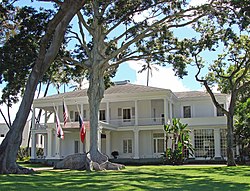Washington Place
|
Washington Place
|
|

The house in 2008
|
|
| Location | 320 Beretania Street, Honolulu, Hawaii |
|---|---|
| Coordinates | 21°18′31.74″N 157°51′24.36″W / 21.3088167°N 157.8567667°WCoordinates: 21°18′31.74″N 157°51′24.36″W / 21.3088167°N 157.8567667°W |
| Area | 3.1 acres (1.3 ha) |
| Built | 1847 |
| Built by | Isaac Hart |
| Architectural style | Greek Revival |
| Part of | Hawaii Capital Historic District (#78001020) |
| NRHP Reference # | 73000666 |
| Significant dates | |
| Added to NRHP | June 18, 1973 |
| Designated NHL | March 29, 2007 |
Washington Place is a Greek Revival palace in the Hawaii Capital Historic District in Honolulu, Hawaiʻi. It was where Queen Liliʻuokalani was arrested during the overthrow of the Hawaiian Kingdom. Later it became the official residence of the Governor of Hawaiʻi. It is a National Historic Landmark, designated in 2007. The current governor's residence was built in 2008 behind the historic residence, and is located on the same grounds as Washington Place.
An American merchant sea captain, John Dominis (1796–1846) came to America in 1819 from Trieste, probably from a Croatian family. After making a number of voyages across the Pacific, he relocated to the islands in 1837 with his Bostonian wife Mary Jones Dominis (1803–1889) and son John Owen Dominis (1832–1891) from New York. The captain was awarded some land in 1842 as settlement of a lawsuit with the British Consul Richard Charlton. The captain continued to take voyages to raise money for the construction of a house. In 1846 he sailed for China on the Brig William Neilson, intending to purchase Chinese-made furniture for the house, which was nearing completion. The ship was lost at sea, along with the American Agent George Brown, and Mary Dominis became a widow. She rented out a suite of rooms to support herself and young John Owen. One of the first boarders was Anthony Ten Eyck, an American Commissioner to the islands appointed by President James K. Polk who established the American Legation in the house. Ten Eyck named the house "Washington Place" in a February 22, 1848 letter, after George Washington in celebration of the first US president's birthday. King Kamehameha III officially approved the name.
...
Wikipedia

